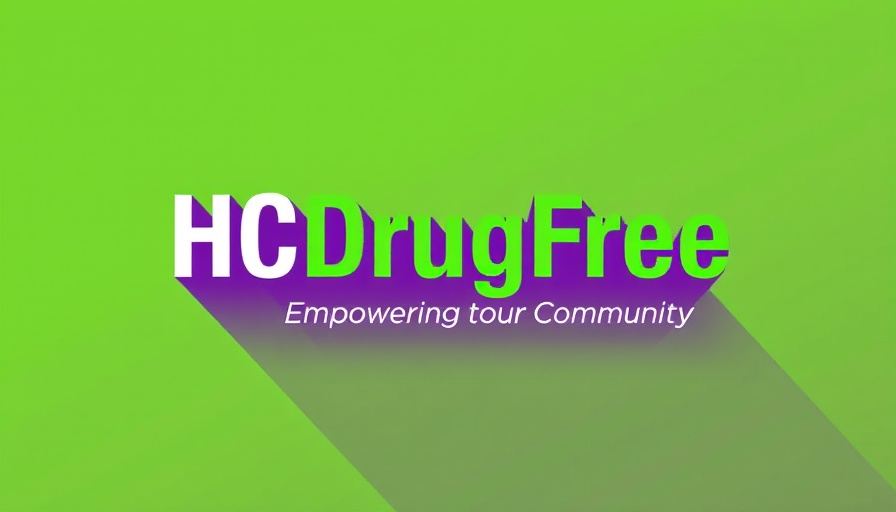
A Heartfelt Call to Action: Sharing Our Stories to Combat Addiction
Each year, countless families face the devastating loss of a loved one to addiction, a tragedy compounded by the isolation and despair brought on by the COVID-19 pandemic. The stories of those we’ve lost are profoundly impactful, not just as individual tragedies, but as a collective call to action that can foster understanding and inspire change in our communities. By sharing these narratives, we can help raise awareness about the critical need for prevention, support, and treatment related to substance abuse.
Understanding the Depth of the Crisis
Accidental overdoses have tragically surged during the pandemic, illustrating a stark reality that many families are struggling to grasp. The lost battles against drugs like opioids, cocaine, and methamphetamine feel insurmountable at times. Yet, as parents and community members, it's vital to understand that addiction is a disease, similar to cancer, and it requires specialized intervention and support.
For instance, the story of Chandler Cook, who lost his life to an accidental opioid overdose after years of struggling with addiction, highlights the cyclical nature of this fight. Chandler’s mother, Michele Holbrook, became an outspoken advocate following her son's death, reminding us how social isolation and economic downturns can exacerbate the struggles of individuals in recovery. In many areas, including Jacksonville, where Chandler lived, emergency services have noted alarming increases in overdose calls, reflecting an urgent need for community awareness and intervention.
The Ripple Effect: How One Overdose Affects Many
The impact of an overdose doesn't end with the individual; rather, it ripples out, affecting family, friends, and the entire community. Families like that of Elizabeth LeFort, who lost her daughter at 23, and so many others recounted the profound grief and trauma experienced in the wake of losing a loved one to drugs. These stories are stark reminders of how addiction does not discriminate— it impacts loved ones from all walks of life and all ages.
These testimonials serve not only as echoes of loss but are also calls to action for those of us still with our loved ones. The community's response to these tragedies can pave the way for preventive measures and support systems that can aid those in need. Events like vigils, community outreach, and open dialogues about addiction are essential for empowering individuals to seek help and increasing public awareness.
Empowering Communities Through Storytelling
In sharing our stories, we create spaces for understanding and empathy—key elements in confronting stigma surrounding substance abuse. As seen in Cape Cod, community gatherings honoring lives lost to overdose also serve as platforms for educating others about the realities of addiction and recovery options.
Moreover, communities can benefit from recovery resources such as local support groups and counseling services, which play crucial roles in fostering a supportive environment. Everyone deserves to have access to addiction recovery coaching and therapy that doesn’t just treat symptoms but provides comprehensive support for lasting change.
The Path Forward: Collective Advocacy for Change
Parents, awareness advocates, and community leaders must unite to create proactive measures against addiction. These efforts might include lobbying for better funding for addiction treatment centers and educational programs in schools to help parents and children better understand the risks associated with drug use.
Recovery initiatives—such as sober living arrangements, counseling, and therapy—must be accessible. Advocating for targeted addiction prevention strategies addressing both the physical and mental aspects of addiction is imperative. Programs that focus on dual diagnosis treatment and trauma-informed care are essential in addressing the complexity of addiction and its underlying causes.
Reshaping Perspectives and Conversations on Addiction
Knowledge is a powerful tool in combatting the issues tied to addiction. Educational initiatives can equip parents with the tools they need to have open conversations with their children about substance use, teaching them about safe medication practices and the dangers of experimental usage.
Ultimately, fostering an environment where families feel empowered to share their experiences, advocate for their loved ones, and connect with the available resources can significantly impact recovery outcomes.
Conclusion: A Shared Mission for All
As we reflect on the heartbreaking stories of loved ones lost to addiction, let us commit to creating meaningful change. By sharing these stories, individuals can build connections that lead to understanding, compassion, and constructive action aimed at prevention and recovery. Together, we can bear witness to the struggles faced by those grappling with addiction and honor the memories of those we’ve lost by striving for a future free from the grips of substance abuse.
If you or someone you know is struggling with substance abuse, reach out for help. Contact the Substance Abuse and Mental Health Services Administration (SAMHSA) helpline at 1-800-662-HELP (4357) for more resources and guidance during your recovery journey.
 Add Row
Add Row  Add
Add 




 Add Row
Add Row  Add
Add
Write A Comment